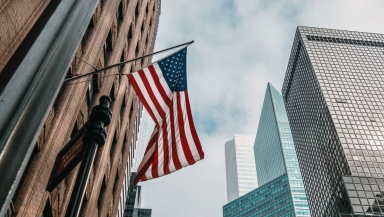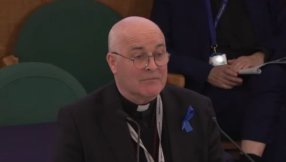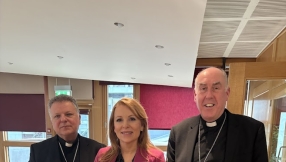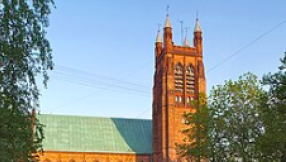
The US has long been regarded as the home of more Christians, as a percentage of its population, than any other nation on earth. In 2014 an extensive programme of research, by the renowned polling organization, the Pew Research Center, revealed that 70.6% of adult Americans identified as Christians of some form. And of the total US population, 25.4% identified as evangelicals.
When evangelicals act as a bloc they have been hugely influential. It is now well known that 81% of white evangelicals voted for Donald Trump in 2016. A similar percentage of these believers voted for him in November 2020. The support of white evangelicals (and it is necessary to add that racial clarifier) for the Republican Party has become one of the norms of US politics.
Given the highly committed nature of these believers when it comes to voting, they often punch well above their weight when compared to similar sized groups, who don't exhibit such high turnout when it comes to activism.
This level of commitment has impacted on many areas of policy. The fact that current US abortion legislation may well be overturned this coming autumn, when the Supreme Court once more examines the issue, is a significant example of the effects of the evangelical vote; in this case allied with conservative Catholics.
"The Times They Are A-Changin"
However, demographics do not stand still and, in the words of Bob Dylan's 1964 song (and album), "The Times They Are A-Changin." Even something as apparently solid as the role of white evangelicalism in US culture and politics is potentially subject to turbulence. And also to decline. While methodologies vary between polls and, sometimes, we might question the accuracy of an individual poll, the overall trajectory is clear and thought-provoking.
Polling in 2020 suggested that the total number of Christians as a percentage of registered US voters had fallen to 56%. This was hugely down, when compared to 2014, and was difficult for many observers to accept. However, other data (this time from 2021) suggests that something significant is going on. Data, from March 2021, and reported in The Washington Post in April, suggested that the number of Americans identifying as Christian has fallen to 65%. This is still very large but a downward trajectory is apparent. It seems to indicate a fall of 5% since 2014.
In a related statistic, those registering as having 'no religious identity' went from 15% of the population in 2016, to 21% in 2020. Something appears to be shifting in the US religious landscape. Cultural tectonic plates are on the move.
This is becoming particularly apparent within the US white evangelical community. In July 2021 the Public Religion Research Institute (PRRI) published new data, as part of its '2020 Census of American Religion', that is very revealing. The PRRI data reveals what can only be described as an extraordinary decline in the number of white Americans who now identify as 'evangelical Christians.' As the PRRI report concludes: "Since 2006, white evangelical Protestants have experienced the most precipitous drop in affiliation, shrinking from 23% of Americans in 2006 to 14% in 2020."
Not only this, but the PRRI research reveals that these white evangelicals constitute the oldest age-profile of any identifiable group of religious Americans. They have an average age of 56. In short, white US evangelicalism is both shrinking in size and failing to attract younger members. Or, as importantly, it is shedding its younger members who no longer wish to be classified as part of this group. If the current rate of decline continues, we could expect the number of US white evangelicals, as a percentage of the US adult population, to be in single figures by 2030. And they will also be old.
Glass half-empty, or glass half-full?
The data, though, is even more surprising than this. What the PRRI statistics reveal is that, while white evangelicalism seems to be declining, the numbers of what might be called 'mainline Protestants' is increasing. This includes the Presbyterians, Congregationalists, Episcopalians, United Methodist Church, United Church of Christ, Evangelical Lutheran Church, etc. These churches now represent 16.4% of the US population. In contrast with declining evangelical numbers, this is a movement up from 13% in 2016. As a result, if PRRI is correct in its polling methodology, 'mainline Protestants' now constitute a larger group in US society than white evangelicals. There is evidence which suggests that some members of the latter have shifted to the former.
What seemed to be the unstoppable rise of evangelicalism, and the terminal decline of 'mainline' Protestant churches, has flipped. In the USA, white evangelicals are usually found in churches affiliated to the Southern Baptist Convention (SBC) or the Assemblies of God; or are members of independent nondenominational mega-churches. For over thirty years, these have been the groups in the headlines and often present at presidential prayer breakfasts. Indeed, during the 1990s, activists from this area of the US Christian community made massive inroads into the Republican Party and have been hugely influential there ever since.
While this happened, nobody took much notice of the other Protestant groups. As Bill McKibben concluded, in a recent edition of The New Yorker: "for decades, the media paid no attention to these declining (and demure) denominations, concentrating instead on the provocative Falwells, Swaggarts, and Robertsons."
In a piece appearing on The-CNN-Wire, the American historian of Christianity, Diana Butler Bass (who moved from 'mainline church', to 'evangelical', and then back again) pithily described the previous status quo: "If one was born after 1980, it was hard to know that mainline Protestantism even existed." That is not the case now.
What is going on?
In 2007, research found that a significant number of young evangelicals were concerned at church attitudes towards what was then termed 'gay rights.' In the 14 years since then, the areas of generational difference regarding social issues has broadened. By 2014, the Pew Research Center's 'Religious Landscape Study' noted a significant generation-gap among US evangelicals on same-sex marriage, immigration, environmentalism, and state aid for the poor. But the matter was complex, with little generational difference with regard to views on abortion and support for the Republican Party.
Since 2014, though, areas of generational difference have accelerated. In May 2021 a survey, commissioned by the University for North Carolina at Pembroke, found that younger evangelicals are significantly less supportive of Israel compared with older evangelicals, and the trend is accelerating. A dramatic shift had occurred between 2018 and 2021. In this time, support for Israel among young evangelicals dropped from 75% to 34%.
This trend accompanied increasing concern for the rights of Palestinians within this younger group, as revealed in the University of Maryland's 'Critical Issues Poll' 2015-18 (re-analysed in May 2021), which also revealed that younger evangelicals are increasingly more diverse than older evangelicals – and less white.
Conflict over gender is also building. In May 2021, Saddleback Church in California – the second-largest church in the Southern Baptist Convention – ordained three women as staff pastors. The move drew criticism from other leading members of the SBC. The ban on female pastors has caused many Baptist churches to leave the SBC since the 1990s, to form the Cooperative Baptist Fellowship which now claims about 1,400 churches as members (although some continue to have dual affiliation with the SBC).
While all this has been going on, there occurred a further political move to the right among Republicans and their (older) evangelical allies. As Diana Butler Bass recently put it: "Evangelicalism became the religious right." It is this polarization of politics – with many evangelicals increasingly seen as the hard-right at prayer – that seems to have caused a gear-change in the process of decline between 2014 and 2021.
A leading US evangelical, in an off-the-record comment to me, described what has happened since November 2020 as "the continued departure by millions of young evangelicals who are disgusted with the toxic politicization of their spiritual community." And it is clear that it is not just the young who are moving out.
The evidence suggests that what drew huge numbers to US evangelicalism in the 1980s and 1990s was its emphasis on personal faith, biblical certainty, and traditional morality. What now repels many (especially among the young) is the commitment to right-wing politics, as seen for example in climate change denial and lack of enthusiasm for tackling racial injustice and issues relating to women's rights.
Overall, the US evangelical church faces a huge task and that is to remain true to the moral and personal challenge of the gospel, while expressing this in a way that reaches out to the marginalised, the poor and the oppressed. They are, of course, not alone in facing such a challenge. It is just that they have previously camped out on such extreme ground.
If it can strike such a balance, it will no longer be able to continue its current politically partisan role. The recent PRRI survey found that 35% of 'white mainline Protestants' identify as Democrats, 33% as Republicans, and 30% as independents. In short, the monolithic political character that has characterised US evangelical communities is not reflected in the Christian faith communities where decline is being arrested and reversed.
For evangelicals who have so closely tied themselves to one political party (and latterly to one man) – and to all the political ideology which accompanies this – that may be something on which to reflect. If not, it will be interesting to see what the data reveals ten years from now.
Martyn Whittock is an evangelical and a Licensed Lay Minister in the Church of England. As an historian and author, or co-author, of fifty-two books, his work covers a wide range of historical and theological themes. In addition, as a commentator and columnist, he has written for a number of print and online news platforms; has been interviewed on radio shows exploring the interaction of faith and politics; and appeared on Sky News discussing political events in the USA. His most recent books include: Trump and the Puritans (2020), The Secret History of Soviet Russia's Police State (2020), Daughters of Eve (2021) and Jesus the Unauthorized Biography (2021).













